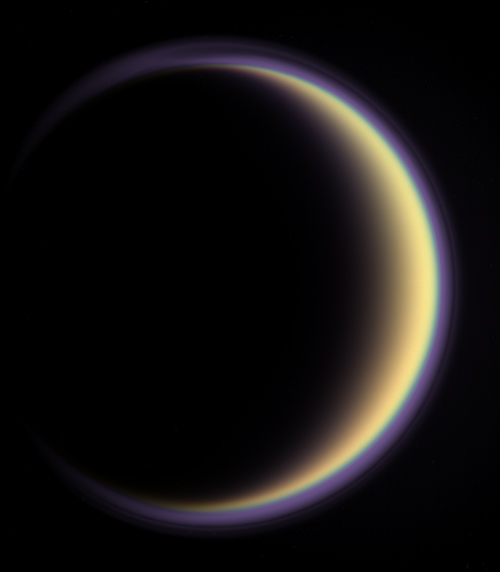Scientists to Scan Titan's Atmosphere From Earth

Breaking space news, the latest updates on rocket launches, skywatching events and more!
You are now subscribed
Your newsletter sign-up was successful
Want to add more newsletters?

Delivered daily
Daily Newsletter
Breaking space news, the latest updates on rocket launches, skywatching events and more!

Once a month
Watch This Space
Sign up to our monthly entertainment newsletter to keep up with all our coverage of the latest sci-fi and space movies, tv shows, games and books.

Once a week
Night Sky This Week
Discover this week's must-see night sky events, moon phases, and stunning astrophotos. Sign up for our skywatching newsletter and explore the universe with us!

Twice a month
Strange New Words
Space.com's Sci-Fi Reader's Club. Read a sci-fi short story every month and join a virtual community of fellow science fiction fans!
HONOLULU (AP) - Scientistsstudying the atmosphere of Saturn'smoon, Titan,hope their research will reveal clues about the nature of Earth's atmospherebillions of years ago.
Ralf Kaiser, a Universityof Hawaii physical chemist and associate professor, is leading the team ofinternational scientists recently awarded a five-year, $2.5 million grant forthe project from the National Science Foundation's Collaborative Research in ChemistryProgram.
Titan's atmosphere is consideredideal for gaining a better understanding of the early days of Earth's atmosphere because it andproto-Earth are believed to have emerged with similar atmospheres from thesolar nebula - the cloud of dust and gas from which it is believed our solarsystem originated.
Hydrocarbon molecules inTitan's atmospheric layers also absorb destructive ultraviolet radiation fromthe sun, preserving other molecules that are important for understanding theorigin and evolution of the planets.
"Understanding theformation and growth mechanisms of these molecules and applying these findingsto better comprehend the hydrocarbon chemistry of Titan's atmosphere is a keyobjective of our project,'' Kaiser said.
Researchers will beobserving Titan using the NASA Infrared Telescope Facility on the summit ofMauna Kea on the Big Island.
Other schools participatingin the project include Wayne State University, Florida InternationalUniversity, Emory University, California Institute of Technology and France'sUniversity of Rennes.
Breaking space news, the latest updates on rocket launches, skywatching events and more!
As part of the project, theteam will also develop teaching materials and organize annual scientificworkshops as well as attempt to broaden the participation of minorities inresearch at the participating schools, and encourage more graduate andundergraduate students in general to do hands-on research in fields such asastrochemistry.
The team's first workshopis scheduled for February 2007.
- Video:Parachuting onto Titan
- IMAGES:Huygens Drops Down on Titan's Surface
- IMAGES:Imagining Saturn and Titan
- Lakes Foundon Saturn's Moon Titan

The Associated Press, also known as the AP, is a wire service that provides articles to a host of newspapers and websites. The news organization was founded in 1846, when the company delivered the news by pony express. The Associated Press journalists cover news from around the world and in all subject matters.
